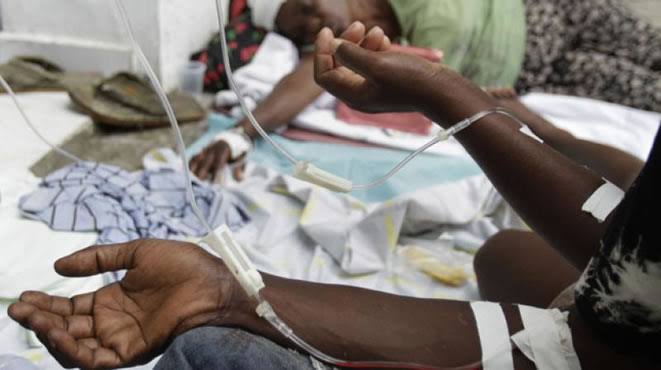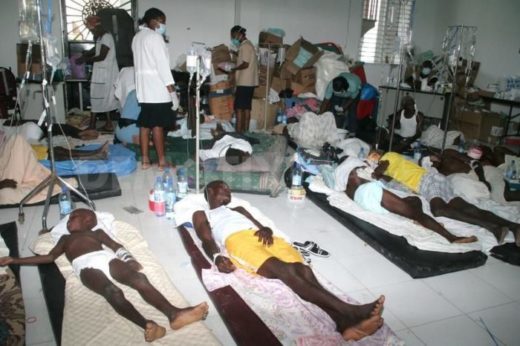Health
Cholera and Economics
Published
2 years agoon

I got my first hint of a possible health epidemic when I went shopping in my local supermarket and I noticed that the security guard smelled quite bad due to lack of persona hygiene, you can’t blame them, I mean this was after the cost of cleaning items both personal and household have gone up 300% and minimum wage had stayed the same.
I also noticed that my local security guards at my residence had a similar problem and handing out soap and deodorants wasn’t enough to stop what was coming, it was clear to me that being clean was becoming harder and harder for the masses every single day and if health is wealth then it takes a lot to stay healthy in terms of finance, I mean you could have sloppy rich people and fit poor people but most of the time I have comes to understand the link between your health and your economics.
There are cases in which some people rise above the occasion, for example, the neatest buying my secondary school lived in a house smaller than my bedroom but he came to the school looking like a million bucks, far better than the chauffeur-driven rich kids, even though he had to hop three busses to get to school. But that was an exception, not the rule, there is a cost to hygiene and now we are paying for it.
READ ALSO: Cholera spreads to Ogun, Okada riders major victims
As the world’s longest-running pandemic, cholera poses a public health burden wherever human vulnerability intersects with sanitary variability. Barriers to safe water and sanitation place the health of millions in jeopardy, I had no idea which of the sanitation epidemics would break out first but, the cholera outbreak is just the tip of the iceberg, we might still see Kwashiorkor epidemic, the WHO AND DOCTORS WITHOUT BORDERS have sent out some warning on malnutrition rates among children in Nigeria. This cholera outbreak is very worrisome because a disease that is linked to poverty is back again, it shows the economic situation of the country. People have started drinking and cooking with unsafe water again as they cannot afford to buy even not-so-safe sachet water of #500 per bag.
Nigeria is witnessing one of the worst economic crises of this generation or so and this crisis has had an impact on the daily economics, healthcare and sanitation. Thus, making cholera a forerunner of something worse, more deadly and contagious than any other outbreaks waiting out there. Cholera is just a symptom of systemic deterioration of our social amenities and services. The economics of the day determines the health of the day. The entire micro and macroenvironments are not spared. Healing the economics of the day would lead to healing a nation.
Austerity is behind the cholera outbreak. People must cut back their use of water due to FINANCIAL CONSTRAINTS, yet the water demand is unchanged. Cholera outbreaks originate from an unhygienic area. I don’t think you need to be rich before learning hygiene but when there is a limitation on hand washing and toilet flushing, something must give.
READ ALSO: Cholera: NOA takes enlightenment campaign to Jigawa communities
There are reasons why cholera is famous for bringing down empires, and kings and ending military campaigns, ending it was necessary for the sustainability of any civilisation,
“In other words, plagues don’t tend to end until their human hosts re-engineer the environment that allows them to thrive.” a scourge of the 18th and 19th centuries that delivered seven pandemics due to global trade and the Industrial Revolution. This plague didn’t stop ravaging the working poor of Europe until engineers improved water treatment and wastewater disposal.
I do think there is a correlation between high population density and poor sanitation in areas with intense poverty. Most poor people live in unhygienic environments, with unclean water/food. If your economy is minting poor people in record numbers, cholera won’t be far away. Even though in Lagos where I live, the outbreak cases seem to be coming from the island and Lekki axis, letting us know how connected we are in times of crisis regardless of status.
Like most communal diseases there are some Economic costs to society.
- Healthcare Costs. Outbreaks lead to increased healthcare spending on treatment, including hospitalization, rehydration therapy, and antibiotics. This includes Preventative measures, such as vaccination campaigns and water purification initiatives, which require significant financial investment.
- Productivity Loss. Cholera primarily affects populations in developing countries, often striking those in the workforce. Also, Illness and death lead to reduced productivity and labour force participation, which can hamper economic growth and development.
- Tourism Impact: Cholera outbreaks can deter tourists, affecting revenues in regions dependent on tourism. Also Fear of disease spread can lead to travel restrictions and advisories, further reducing tourist numbers.
- Agricultural and Trade Effects. Contaminated water sources can affect agricultural productivity, leading to food shortages and increased food prices, Trade restrictions may be imposed on affected areas, impacting local economies reliant on the export of goods.
- Long-term Economic Consequences. Recurring outbreaks can perpetuate cycles of poverty, as affected regions struggle to allocate resources for both immediate response and long-term infrastructure improvements. Investments in water and sanitation infrastructure can have high upfront costs but are essential for long-term economic stability and public health improvement.
- Lose of Direct foreign investment– few things outside war scare away business-related visits than a local deadly epidemic, few things say “ no open for business “ than a disease t linked to poor sanitation, even with vaccines, it’s a sign of worse things to come.
Addressing cholera effectively requires a multi-faceted approach involving public health initiatives, infrastructure development, and economic planning to mitigate both the immediate and long-term economic impacts.
Ensuring Health, Safety, and Environmental (HSE) measures to prevent and control cholera involves multiple strategies.
Health Measures.
- Vaccination: Administering oral cholera vaccines (OCV) to at-risk populations.
- Surveillance: Monitoring and reporting cholera cases to detect outbreaks early.
- Rapid Response: Implementing rapid response teams to manage outbreaks with medical treatment and control measures.
- Treatment Centers: Establishing dedicated cholera treatment centres with adequate supplies of rehydration solutions, antibiotics, and other essential medicines.
- 5. Health Education: Educating communities about cholera transmission, symptoms, and the importance of seeking early treatment.
Safety Measures.
- Safe Water Supply: Ensuring access to safe drinking water through purification, chlorination, and storage.
- 2. Sanitation: Promoting proper sanitation practices, including constructing and maintaining latrines and sewage systems.
- Hygiene Practices: Encouraging regular handwashing with soap, especially before handling food and after using the toilet.
- Food Safety: Implementing food safety measures, such as proper cooking, handling, and storage of food to prevent contamination.
- Personal Protective Equipment (PPE): Providing PPE for healthcare workers to prevent infection during patient care.
Environmental Measures
- Water Quality Monitoring: Regularly testing water sources for contamination and taking corrective actions when needed.
- Waste Management: Proper disposal of human waste and garbage to prevent contamination of water sources.
- Environmental Cleanup: Ensuring thorough cleanup of areas contaminated by cholera bacteria, including disinfecting homes and public spaces.
- Community Involvement: Engaging communities in environmental health initiatives to reduce the risk of cholera transmission.
By implementing these comprehensive HSE measures, communities can significantly reduce the incidence and spread of cholera, ultimately protecting public health and safety.In life there are causes and effects, cholera is an effect and while working on fixing it, we shouldn’t lose sight of the causes.
OVIGHO RICHARD OKOJEVOH-CIEH.SMC.PMP.SPOC
Is the Executive Secretary of the Society for Health, Safety, and Environmental Education
You may like
Trending

 Business1 week ago
Business1 week agoNaira mixed across markets as official window dips, parallel market strengthens

 Football1 week ago
Football1 week agoUCL Playoff: Gordon scores four as Newcastle thrash Qarabağ 6-1

 Entertainment6 days ago
Entertainment6 days agoSinger Simi faces backlash after TikToker admits to false rape allegation

 Entertainment3 days ago
Entertainment3 days agoSimi addresses resurfaced 2012 tweets amid online backlash

 Business1 week ago
Business1 week agoThree Crowns Milk launches nationwide Ramadan campaign to promote heart-healthy nourishment

 Latest1 week ago
Latest1 week agoTinubu defends electoral reform, downplays mandatory real-time upload

 Comments and Issues6 days ago
Comments and Issues6 days agoNigeria’s Declining Oil Output and Soaring Foreign Portfolio Investment Inflow

 Business6 days ago
Business6 days agoPENGASSAN warns Tinubu’s executive order on oil revenues could jeopardise 4,000 jobs



